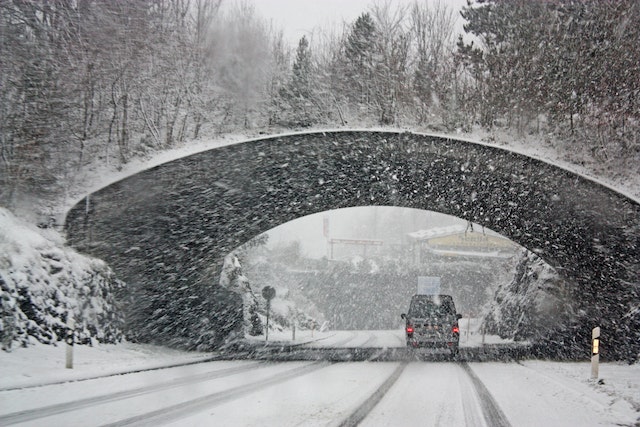Winter weather can be treacherous for even the most experienced drivers. Icy roads, blowing snow and low visibility can all lead to accidents. If you’re in charge of a fleet of vehicles, it’s important to take steps to keep your drivers safe during the winter months. In this article, we will discuss five tips for towing in winter weather.
1. Have an Emergency Plan in Place
Before heading out, drivers should be aware of the risks and have a plan for navigating winter weather and have a risk management strategy that addresses potential hazards like icy roads or low visibility. Part of the plan should be to have all the necessary supplies onboard in case of an emergency, including basics like
- blankets
- a first-aid kit
- jumper cables
- a shovel
Emergency plans should also include knowing when and how to call for help. If your fleet vehicle becomes stuck in snow or ice, it’s best not to try and extricate the vehicle yourself. Instead, call for additional professional help.
2. Remember the Basics
Brakes should be checked before every journey, but this is especially important in winter weather to ensure they will be able to handle icy roads or snow-covered terrain. Also inspect tires for tread wear and pressure as this is critical for safe stopping power, and tire pressure can be affected by cold temperatures. Check headlights and brake lights to ensure they’re in good condition. This is especially important when visibility is low due to snowfall or fog. Also make sure fluids are topped off, windshield wipers are in good condition, and clear any snow or ice off the vehicle before driving.
3. Slow Down and Stay Alert
Towing in winter weather can be dangerous, so slow down and stay alert. The recommended speed for driving in snow or ice is around 30 mph. This will help keep your vehicle under control, while also allowing you to stop safely if necessary. Additionally, give yourself plenty of time to react to any changing conditions, and allow extra space between you and other vehicles on the road.
4. Winter Maintenance
As conditions become more extreme, it’s essential to keep your vehicle running smoothly. While preventive maintenance is always important, there are also other steps you can take to ensure peak performance in cold weather, including:
- Diesel fuel contains paraffin molecules that can clump together when temperatures drop below freezing and lead to gelling. By switching to a winter blend, the risk for costly repairs and breakdowns, including engine failure, will be drastically reduced.
- During colder weather, engine oil thickens and can cause non-starts or other problems. To prevent this from happening, make sure to use a viscosity that is suitable for cooler climates. Before deciding on an appropriate type of oil, it’s always best to check in with OEM guidelines.
- Before heading out on your journey, be sure to check that the batteries are fully charged and working correctly as extremely cold weather can cause battery life to deplete quickly.
5. Be Proactive
Finally, fleet managers should do their best to stay informed on local weather conditions and road closures. Have drivers check in periodically to make sure they are on the right route and aware of any potential hazards. Be sure to have a reliable fleet tracking system in place so fleet managers can stay up to date on their vehicles’ location, and be sure to regularly review your emergency plans with your drivers so that they know what to do in case of emergency.
By following these tips, fleet managers can help ensure their drivers are safe while towing in winter weather. With a good plan and the right tools, fleet drivers can stay safe even when dealing with hazardous conditions this wintry season.
For more risk management strategies, reach out at 888.263.4656 or [email protected]! At Kapnick, we have risk solutions in place specifically for towers and would be happy to help you strategize for safe driving, no matter what the weather or season.





